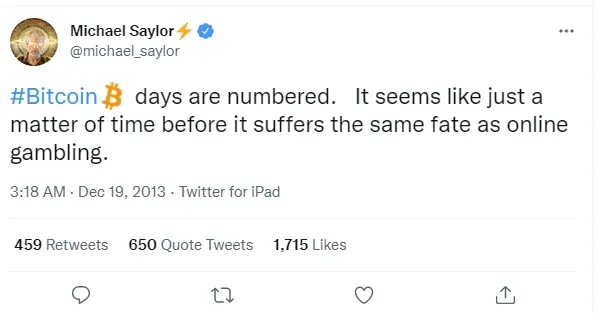
Source
China is now calling illegal all cryptocurrency transactions. Until recently, all Chinese civilians could hold cryptocurrencies, but the ban has slowly and strategically expanded, from exchanges to mining and now to transacting.
We may think this is not possible in a Western country, but a government can easily force a ban with no major opposition. The public still doesn’t use cryptocurrencies, and it is not a widely adopted method of value exchange.
What we have today is not an adoption of cryptocurrencies, but investors in Robinhood, gambling their extra money. A government will have it easy to just ban. Although, the problem now is not the users but the millions of European and American investors.
And since it is 99% investors looking for profit, regulations are applied, just for the taxing purposes. The China example can be easily applied any time it fits a new government narrative of "protecting" the public and the economy.

The 2011 Online Gambling Ban (The Black Friday)

Michael Saylor, in 2013. Source: Twitter
Since 2013 and the “gamblification” of Bitcoin by MtGox exchange, there was one enormous concern, a blanket ban by the US and EU governments.
The collapse of MtGox probably helped cryptocurrencies, since there was no interest until perhaps 2016 again. No interest and a market having thin volumes weren’t important for regulations, so they only looked at crypto again by the end of 2017. The US taxed crypto, and probably this marked the end of that parabolic bull run.

In April 2011, the US government announced online gambling was illegal and seized the Full Tilt Poker website after federal agents discovered many irregularities, making the online poker room resemble a Ponzi Scheme.
Online poker, together with live events like WSOP, was on the rise for many years, having reached high numbers of players, viewers, and extreme volumes. Everyone wanted some action, and it was Pokerstars, Full Tilt Poker, and various other poker rooms offering it.
It became a concern for authorities once far too many youngsters were abandoning their studies or work, trying to follow the “Tom Dwan” dream. The problem with poker is that 90% of poker players will eventually bust. A 5% will be in a middle position not losing or profiting much, and another 5% will be at the top of this pyramid, making extreme returns and become the attraction of the game.
Online gambling today is banned or regulated strictly in most regions of the world. But I will not analyze online gambling too much, perhaps in another article, since I have already wasted thousand of hours researching online poker and studying how these websites work.
Crypto Trading Today

Source
Crypto is today what poker was back in 2011. Ten years after the “Black Friday” events, crypto seems to be about 100 times what online poker was in 2011.
The volumes in unregulated derivative trading exchanges have grown so much that the US, UK, and a few other countries have barred Binance, Bitmex, and more from offering services to their citizens.
A veil of investment covers any kind of absurdity with dog tokens like Shiba Inu to projects that claim that will create a working platform in the future, yet this is enough to reach 100 billion in valuation.
If any kind of business or project has the same extreme marketing team as Cardano has, it can also have blockchain-based flying cars for its concept. After enough brainwashing, anything is possible.
It doesn’t need a lot for any government to act immediately by putting a blanket ban on all cryptocurrencies, as long as one similar event takes place. I think that once something similar to the size of Plus Token appears in the US or the EU, there will be similar action.
China had various Ponzi schemes, money laundering, and other scams as an excuse.
"widespread, disrupting economic and financial order, giving rise to money laundering, illegal fund-raising, fraud, pyramid schemes and other illegal and criminal activities."
It is not about protecting the public, though. China only cares to control and tax the flow of money. There is a rise in financial fraud and crimes in China, but China is also experiencing the same rise in financial fraud, every booming economy does. It is not about Crypto, this is just irrelevant and misdirecting from the real issues.
The Chinese government desires complete control of all financial aspects of its economy and plans to do that with the Digital Yuan. The CBDC.
China, the US, and the EU want control, CBDCs provide it
All of the talk about protecting the public and the economy are mere excuses. A government will only intervene when there is enough cause for concern. The concern is hardly about the population, but about the strength, stability, and continued influence of the government over the population.
Do people want digital money? The governments will create a CBDC and force the use of it.
Do people demand cryptocurrencies to be accepted? The government will create a KYC-compliant centralized wallet under its strict supervision. Maybe Chivo will become the standard of government-controlled BTC since we see today such high rates of acceptance by the BTC community.

In Conclusion
If people are outraged, the government will feel vulnerable, so by any means, it will try to calm the public and deter disobedience. Finally, it will ban the use of anything it doesn’t control, and even threaten with fines, violence, and capital punishment if needed for the disobedient.
Capital punishment in the West (besides the US) is forbidden, but it is equally disturbing to know we will be considered criminals if we transact using cryptocurrencies. Maybe we have taken this event in China too lightly.
A ban on cryptocurrencies severely violates the human right to interact and transact with others.
Not even going to describe all the recent events with Covid and how this virus is now a tool for the re-creation of policies coming from previous centuries that led to extreme human rights violations and an increase in governmental power and control over all aspects of societies.
There is a good number of cryptocurrencies today that can be considered decentralized, with miners around the world using ASICs, GPUs, and other devices. These networks can't be stopped in a sense. There is no on/off switch but any kind of ban will make the asset class less appealing to institutions and wealthy investors.
But not to the public. Even as illegal, crypto can keep rising, especially with the most recent DeFi developments.
A ban in the West may not come, but the governments have sought and are now ready to force a mandate for their crypto policy. It will be "Chivo" or nothing.
KYC compliant wallets with custodial mechanisms.
Not exactly the same Chivo wallet of El Salvador, but a similar one. To tell you the truth, it is better to realize the IMF is not against El Salvador in this. It enjoys watching a real-life test application of a custodial digital currency in a Central American economy.

Originally published at Read.Cash
Writing on the following networks:
Noise Cash - Read Cash - Hive - Medium - Vocal - Minds - Steemit - Den.Social - Publish0x
Follow me on social media:
Twitter - Reddit - LinkedIn - Email

Don't forget to Subscribe/follow if you enjoyed the content!

